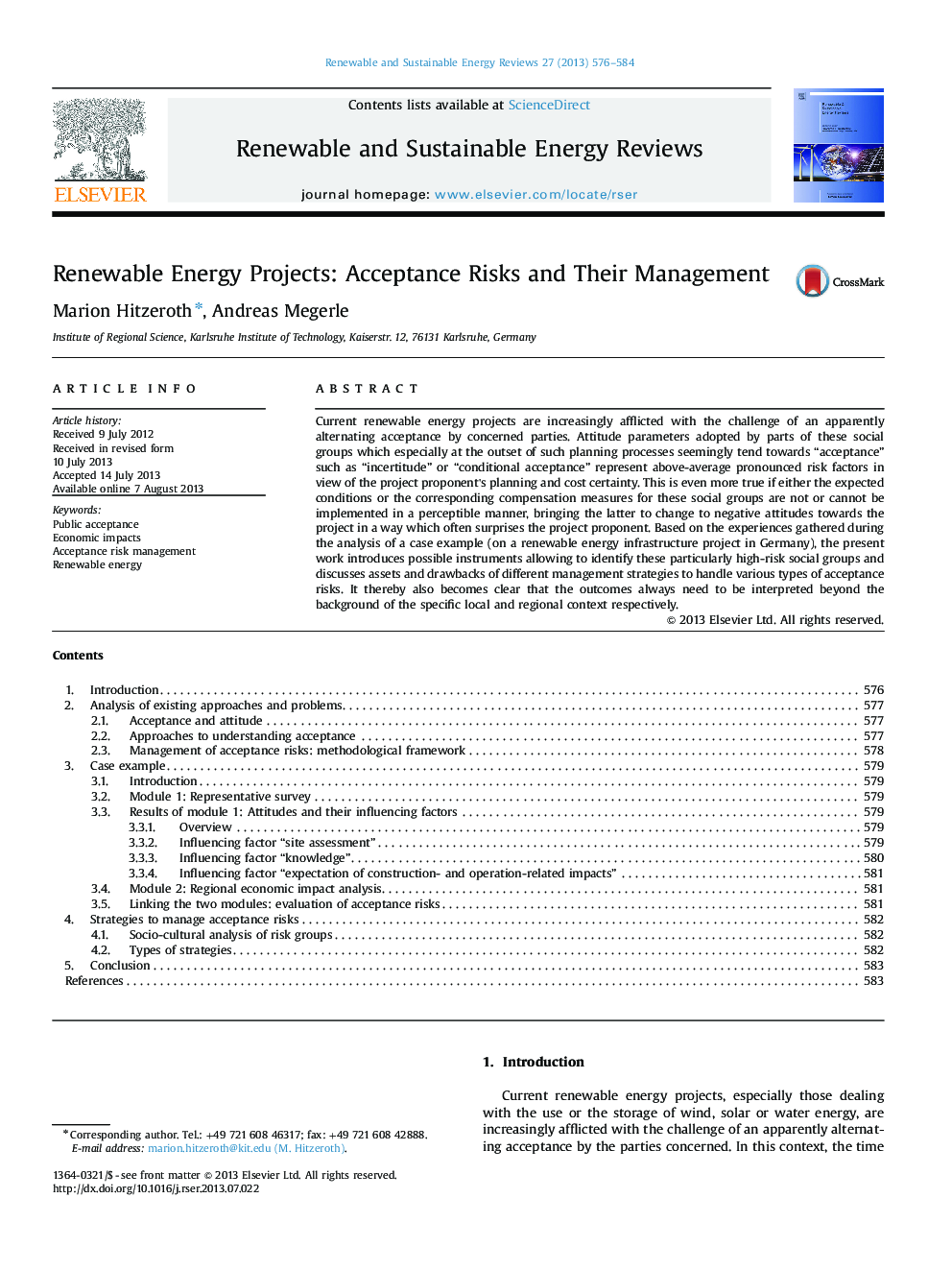| کد مقاله | کد نشریه | سال انتشار | مقاله انگلیسی | نسخه تمام متن |
|---|---|---|---|---|
| 8121539 | 1522358 | 2013 | 9 صفحه PDF | دانلود رایگان |
عنوان انگلیسی مقاله ISI
Renewable Energy Projects: Acceptance Risks and Their Management
ترجمه فارسی عنوان
پروژه های انرژی تجدید پذیر: خطرات پذیرش و مدیریت آنها
دانلود مقاله + سفارش ترجمه
دانلود مقاله ISI انگلیسی
رایگان برای ایرانیان
کلمات کلیدی
پذیرش عمومی، تاثیرات اقتصادی، مدیریت ریسک پذیرش، انرژی تجدید پذیر،
ترجمه چکیده
پروژه های انرژی تجدید پذیر کنونی به طور فزاینده با چالش پذیرش ظاهرا متناوب طرف های ذینفع مواجه می شوند. پارامترهای نگرشی که توسط بخش هایی از این گروه های اجتماعی به تصویب رسیده اند و به خصوص در ابتدای فرآیند برنامه ریزی به نظر می رسد به سمت پذیرش؟ مانند یک "حدیث" یا پذیرش مشروط با توجه به برنامه ریزی طرح پیشنهادی پروژه و اطمینان از هزینه، عوامل خطرساز شده از میان میانگین ها را نشان می دهد. این درست است که اگر شرایط پیش بینی شده یا اقدامات مربوط به جبران مربوط به این گروه های اجتماعی نمی توانند یا نمی توانند به روش قابل شناختی اجرا شوند، این امر موجب می شود که نگرش های منفی نسبت به پروژه به نحوی که اغلب طرفدار پروژه را شگفت زده می کند . بر اساس تجارب جمع آوری شده در طی تجزیه و تحلیل نمونه مورد (بر روی یک پروژه زیربنایی انرژی تجدید پذیر در آلمان)، کار حاضر ابزارهای ممکن را معرفی می کند که می تواند این گروه های اجتماعی خاص را شناسایی کند و در مورد دارایی ها و نقاط ضعف راهبردهای مدیریتی مختلف برای رسیدگی انواع خطرات پذیرش. به این ترتیب روشن می شود که نتایج همیشه باید فراتر از زمینه های خاص محلی و منطقه ای تفسیر شود.
موضوعات مرتبط
مهندسی و علوم پایه
مهندسی انرژی
انرژی های تجدید پذیر، توسعه پایدار و محیط زیست
چکیده انگلیسی
Current renewable energy projects are increasingly afflicted with the challenge of an apparently alternating acceptance by concerned parties. Attitude parameters adopted by parts of these social groups which especially at the outset of such planning processes seemingly tend towards “acceptance” such as “incertitude” or “conditional acceptance” represent above-average pronounced risk factors in view of the project proponent's planning and cost certainty. This is even more true if either the expected conditions or the corresponding compensation measures for these social groups are not or cannot be implemented in a perceptible manner, bringing the latter to change to negative attitudes towards the project in a way which often surprises the project proponent. Based on the experiences gathered during the analysis of a case example (on a renewable energy infrastructure project in Germany), the present work introduces possible instruments allowing to identify these particularly high-risk social groups and discusses assets and drawbacks of different management strategies to handle various types of acceptance risks. It thereby also becomes clear that the outcomes always need to be interpreted beyond the background of the specific local and regional context respectively.
ناشر
Database: Elsevier - ScienceDirect (ساینس دایرکت)
Journal: Renewable and Sustainable Energy Reviews - Volume 27, November 2013, Pages 576-584
Journal: Renewable and Sustainable Energy Reviews - Volume 27, November 2013, Pages 576-584
نویسندگان
Marion Hitzeroth, Andreas Megerle,
